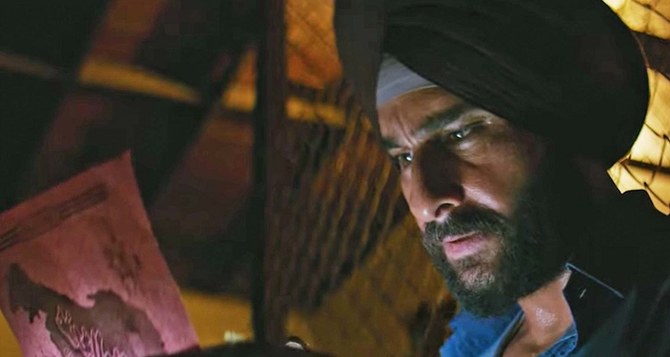CHENNAI: The first season of “Sacred Games” last year was a hit, and the second edition, which began streaming on Netflix on Aug. 15, may be even more so.
The eight episodes explore some of India's most pressing current issues such as a nuclear threat, terrorism and inter-religious animosity dating back to the country's 1947 partition. It. It also addresses how religious men can indulge in the most unholy of acts, including helping corrupt politicians.
Some of the greatest films have had conflict and war as their backdrop: “Gone with the Wind,” “Casablanca,” “Ben-Hur” and “Garam Hawa,” to mention a few. The second season of “Sacred Games” also unfolds in such a scenario, with terrorism and inter-communal disharmony having a rippling effect on the nation.
Directed by Anurag Kashyap (“Gangs of Wasseypur,” “Black Friday”) and Neeraj Ghaywan (“Masaan,” which premiered at Cannes in 2015), the web series, based on Vikram Chandra's 2006 novel, unfolds with Ganesh Gaitonde (played by Nawazuddin Siddiqui) escaping from prison and finding himself in Mombasa. He has been carted there by an agent of India's Research and Analysis Wing, Kusum Devi Yadav (Amruta Subhash), who forces him to help find Shahid Khan (Ranvir Shorey), the mastermind behind bomb blasts and terror attacks.
In Mumbai, police inspector Sartaj (Saif Ali Khan) has just two weeks to save the city from a nuclear attack, which Gaitonde had warned him about. Both men love Mumbai and do not want it to be destroyed. But religious extremist Khanna Guruji (Pankaj Tripathi) and his chief disciple Batya Ableman (Kalki Koechlin) believe that only such a catastrophic destruction can help cleanse society and bring a cleaner, saner new order.
A narrative of deceit, betrayal, love and longing, the second season has a plodding start, but picks up steam from the fourth episode, with Sartaj and his men racing against time to find a nuclear time bomb that could wipe out Mumbai. Crude dialogue and a constant doomsday atmosphere could have been avoided, but riveting performances by the lead pair – Khan and Siddiqui (though he is getting typecast in this kind of role) – and nail-biting thrills make this Netflix original dramatically captivating.


























